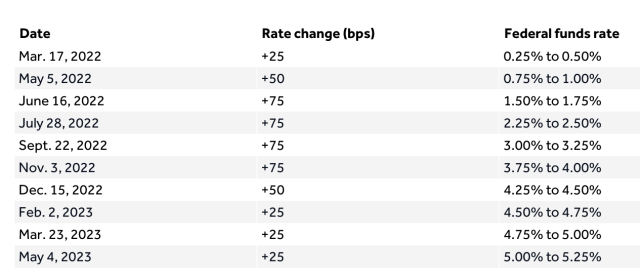Low inventory has done a number on the typically busy Spring homebuying season. But as macroeconomic factors shift week to week, could a sizzling summer market be on the horizon?
Summer is traditionally a busy season for the real estate housing market. The long days and pleasant weather enhance curb appeal and showings, and families are eager to get settled before the school year begins.
Still, 2023 is a strange time for real estate. Stubborn inflation, volatile mortgage rates, high home prices, and an impending recession have left many would-be buyers and sellers on the fence, asking questions like:
- Will mortgage rates go down?
- When will home prices drop?
- Is there a housing market crash coming?
For answers to these questions, we reached out to Dave Meyer, host of the BiggerPockets “On the Market” podcast and author of “Real Estate by the Numbers.” He shared his housing market predictions for mortgage rates, home prices, housing inventory, and more. Here’s what he said.
Will mortgage rates go down?
Mortgage rates affect more than just your monthly payment. They also impact how much interest you pay over the life of the loan—and how much house you can afford.
In January 2021, mortgage rates were at historic lows. Less than two years later (October 2022), rates hit a 20-year high. So far, the Federal Reserve has increased the federal funds rate—the overnight rate at which commercial banks borrow from each other—10 consecutive times since March 2022. Here’s how rates have changed over the past 14 months:

At this point, the Federal Reserve hasn’t ruled out additional rate hikes for 2023, which means interest rates could go up or down. Still, Meyer expects mortgage rates to be fairly volatile but stay within the 6.25% to 7.00% range during the summer months.
What’s happening with home sales volume?
Mortgage rates affect home sales because they impact affordability: the higher the rate, the higher your monthly payment, the more interest you pay over time—and the less house you can afford (all else being equal).
After 10 years of steady growth, U.S. home sales volume peaked in 2021 amid the pandemic-era real estate buying frenzy. The volume of home sales has tapered since then, but it doesn’t mean the market is crashing. Instead, home sales are reverting to their regular, pre-pandemic levels.
If mortgage rates level off and become more predictable, more buyers should return to the market. For now, Meyer expects sales volumes to fluctuate in the coming months. “Home sales volume will likely see a seasonal bounce in the coming months but remain well below 2022 levels.”
Will home prices drop?
Supply and demand determine home prices. With high mortgage rates, many would-be buyers have been priced out of the upper range of their home search or opted to stay in their current digs. That means fewer buyers competing for the same house, which can bring prices down.
At the same time, some would-be sellers can’t afford to move (or are just opting not to) because they don’t want to lose the low mortgage rate they locked in before the Federal Reserve started its rate-hiking campaign. This contributes to fewer homes hitting the market, which can drive prices up.
Of course, every real estate market has different supply and demand characteristics. “The direction of prices will vary significantly by city,” says Meyer. He expects most cities to see a seasonal bump in home prices, but prices will likely remain modestly below 2022 levels on a national scale. “I expect some cities in the Northeast, Midwest, and South could see year-over-year growth, while many cities in the West will see further declines.”
Why is housing inventory so low?
Low housing inventory has challenged property buyers since the Great Recession, and the pandemic only exacerbated the problem. There are a few factors at work:
- Investors swooped up inventory. Real estate investors pounced on the housing market in 2021, representing 24% of single-family home purchases (record-low mortgage rates gave investors access to “free money”).
- There are fewer new construction homes. Pandemic-related supply chain issues and labor shortages have made it difficult for builders to keep up with new housing demand.
- Some sellers are delaying their plans. Many would-be sellers want to keep their existing mortgages and avoid shopping for their next home while inventory is low.
For now, Meyer says that inventory on a national level will stay above last year’s levels but will remain far below pre-pandemic levels. “There is no current indication inventory is going to return to what was normal before the pandemic anytime soon.”
Is it a buyer market or a seller’s market?
Meyer says it’s nearly impossible to describe the national housing market as either a buyer’s or seller’s market because there’s significant variance by region and city.
“Broadly speaking, the Northeast, Midwest, and Southwest will likely be in a seller’s market, albeit much more balanced than recent years,” says Meyer. “Meanwhile, the West will likely be a bit cooler, with most Western cities in a buyer’s market or in a flat, more balanced market.”
Will the housing market crash?
While there’s a lot of uncertainty in the real estate market and economy, many experts believe a housing market crash in 2023 is unlikely.
One reason is that lending standards are much tighter now than those leading up to the 2008 housing crash. That means borrowers are less likely to default on their mortgages and lose their homes to foreclosure. Additionally, most borrowers today have fixed-rate mortgages. So, even though rates are higher, borrowers have predictable monthly payments — and are less likely to get hit with payment stock if interest rates rise.
Another factor that makes a market crash unlikely is that homeowners have record levels of equity. This can help homeowners weather market downturns and avoid becoming underwater on their mortgages.
Bottom line
Keep in mind that housing market predictions are best guesses based on available data. As Meyer points out, the current impasse over the debt limit could change outcomes.
“All of these predictions presume that the government reaches a debt ceiling agreement and does not default on its debt or get so close that U.S. credit is downgraded,” says Meyer. “If either of those events occur, mortgage rates will spike and put significant downward pressure on housing prices.”
Of course, nobody can time the market, so buyers and sellers shouldn’t base their decisions solely on what they think the market will do (or won’t do). Ultimately, the best time to buy or sell a home is when the timing works for you and your financial situation.
…
Source: https://www.sfgate.com/personal-finance/article/housing-market-predictions-2023-summer-18121134.php?utm_campaign=Homeward%20Bound&utm_medium=email&_hsmi=260776601&_hsenc=p2ANqtz-_PVqzeGeKfeFA-X5aComtkBT_a_jgb8of5EyHb9ImsKGoggo00G4UYjoxiIzAFvdRQkcf6fDXyYOImoDFV8_rR0WvUlQ&utm_content=260776601&utm_source=hs_email

